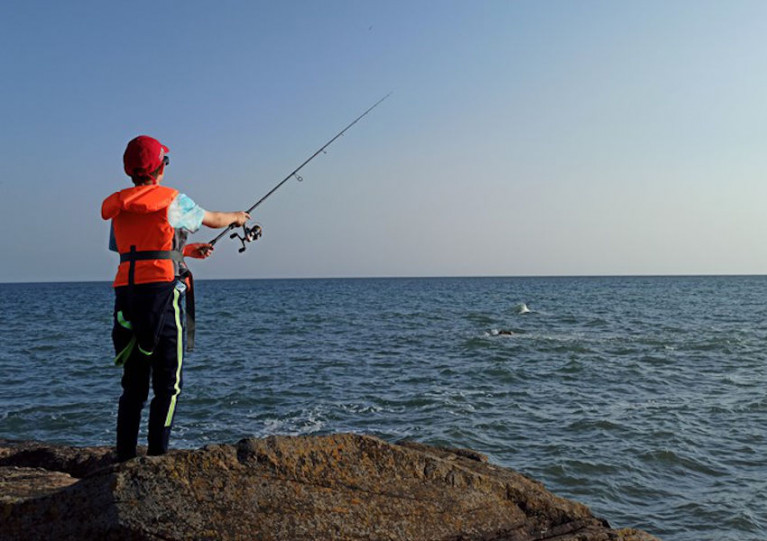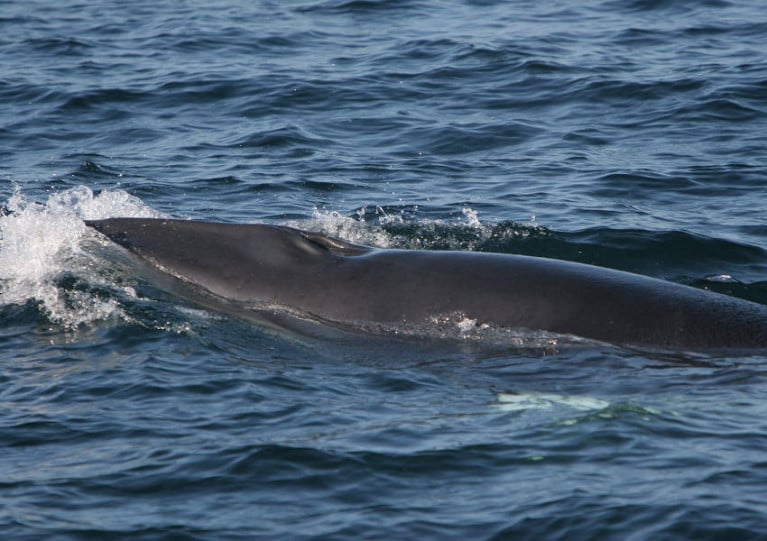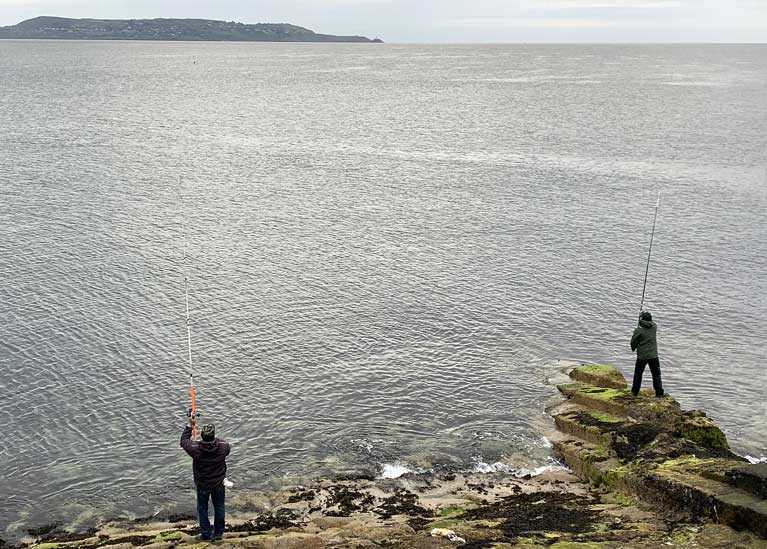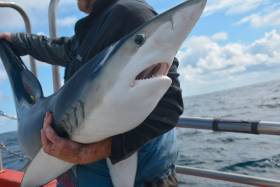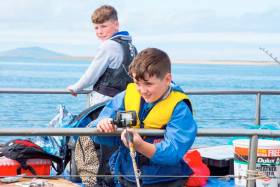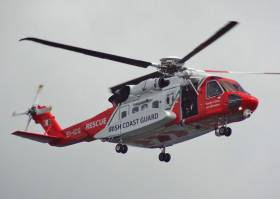Displaying items by tag: sea angling
National Sea Angler App Shows Mackerel, Pollack, Dogfish, Seabass and Whiting are Top 5 Fish Species Hooked in 2022
Mackerel, pollack, dogfish, seabass and whiting were the most-widely caught fish species by Ireland’s 250,000 sea anglers in 2022, according to new data from Inland Fisheries Ireland (IFI).
The results are taken from IFI’s Irish Marine Recreational Angling Survey (IMREC) app, which enables anglers to log their catch details on their phones as they fish.
Other data revealed by Irish shore and boat anglers — fishing along more than 3,000km of coastline — during 2022, reveals that:
- Counties Cork, Clare, Donegal, Kerry and Wexford were hotspots for marine angling;
- During 2022 anglers spent an average of 42 hours each, fishing by the/at sea;
- An average of just over 80 fish were caught by recreational fishermen/women annually;
- During a single trip anglers caught more than six fish;
- Catch and release rates were over 80%;
- Approximately six different species were caught per angler annually.
Flounder, poor cod, dab, ballan wrasse and smooth hound were also among the top 10 most-caught fish species brought ashore around Ireland’s coasts last year.
A survey of 1,200 sea anglers by IFI in 2021 showed that more than 90% of respondents said they primarily fished to relax and unwind, and be in the outdoors.
In addition, they reported spending an average of €100 per fishing trip on food and drink, transport and bait.
They paid a further €970 annually on items such as rods, reels and clothing, and on fishing and boating expenses.
Sea anglers of any experience are invited to sign up to the IFI IMREC app, and a explanatory how-to video guide to IMREC is also available.
Commenting on the 2022 figures, Dr Diarmuid Ryan, research officer with IFI said: “We are very keen for more anglers in this community to sign up to our anonymous, free and easy-to-use app.
“Recreational anglers can become citizen scientists by recording information from their own fishing sessions.
“The app provides invaluable intelligence, in the form of pooled and anonymised information, that feeds into a broader European project that monitors marine fish stocks.
“IFI recognises anglers as critical stakeholders that effectively act as environmental stewards in helping to maintain Ireland’s rich marine life resources.”
Hobby fishermen/women who use the online diary tool can easily log their trips; attach photos of their catches; record details such as tide, weather and bait used; and look back over previous sessions on their own interactive map.
The IMREC app is not available via Google Play or Apple App Store but is a web-based app that is accessed through a web browser.
Earlier this week, IFI revealed that a record percentage of wild salmon were placed back in the water after being hooked by fishermen/women in 2022, as reported on Afloat.ie.
Partnership Seeks to Hook Sea Anglers in Ireland as Citizen Scientists in Busiest Period
More has been shared about plans to attract Ireland’s community of up to 250,000 recreational sea anglers to take part in a large-scale citizen science project and play an active role in helping to conserve marine fish stocks.
Leading geographic information systems company Esri Ireland recently announced that its digital mapping system is being used by Inland Fisheries Ireland (FI) to help safeguard fish populations and protect marine ecosystems, as previously reported on Afloat.ie.
Esri’s ArcGIS system supports the Irish Marine Recreational Angling Survey (IMREC) which aims to estimate sea anglers’ catches along the 3,000km of Irish coastline.
Whether they are shore anglers, small boat anglers or charter boat anglers, each member can sign up to access Esri’s Survey123 web-based app where they can record their catches and angling successes with a personalised dashboard.
IFI is the State agency for protecting, managing and conserving inland fisheries and sea angling resources. To meet its EU data collection requirements around species, locations, and volumes of fish caught annually in European waters, IFI saw a need for a collaborative approach to collate its own data with self-reporting by recreational sea anglers.
Turning anglers into citizen scientists, the easy-to-use app enables anglers around Ireland to gather and upload real-time information from any device about the fish they catch and release.
This anonymised information is then automatically transferred to a shared repository, where it can be easily viewed by the anglers and monitored by IFI to identify patterns in the species distribution, volumes and weight of fish caught, and estimated catch rates. In turn, IFI has greater control over and confidence in the accuracy and consistency of the data collected.
The EU is particularly interested in data on cod, pollock, sharks, rays, sea bass and highly migratory species such as tuna, but the solution can be configured to capture data on other species too.
Sea anglers of all experience levels can sign up via the IFI website, and can also watch a quick and easy video guide on how to use the app on YouTube.
September is one of the busiest periods for sea angling around the Irish coast, so it’s a great time to start recording your catch, according to William Roche, a senior research officer at IFI.
“With more anglers collecting data, we will be able to build up a better picture of the state of fish stocks off Ireland’s coast,” he said. “ArcGIS will enable us to work with anglers as citizen scientists and crowdsource the large volume of data that we require for EU and national reporting.
“The personalised dashboards will help to make the recording of data a habitual activity for anglers, and we hope they will enjoy entering their catch data and take pride in their roles as stewards of the sea.”
Schalk Van Lill, customer success manager with Esri Ireland added: “We are delighted to work with Inland Fisheries Ireland on this project and enable the ongoing monitoring and safeguarding of fish populations.
“Citizen science like this provides broad spatial coverage all around the coastline of Ireland, enabling Inland Fisheries Ireland to efficiently comply with requirements. The solution can be easily scaled up to accept data uploads from more and more participants, allowing Inland Fisheries Ireland to expand the scheme over time.”
Sea Anglers’ Experiences Harnessed to Develop New Scientific Data Collection Method
The State agency responsible for the conservation and protection of sea angling resources has developed an important new tool that captures anglers’ knowledge and hands-on experience to help track changes in stocks of marine fish.
According to Inland Fisheries Ireland (IFI), the new method — called ‘FLEKSI’ — crucially taps into the local ecological knowledge of Irish sea anglers as a way of complementing scientific knowledge.
Over 650 recreational anglers who fish along the Irish Sea, Celtic Sea and West Coast of Ireland have contributed to the development of the tool, which was highlighted in the International Council for the Exploration of the Seas (ICES) Journal of Marine Science earlier this month.
FLEKSI, which stands for ‘Fishers’ Local Ecological Knowledge Surveillance Indicators’, can track how fisheries change over time. IFI says it could also have a much broader application in helping to conserve or manage fisheries internationally, as all EU member states are obliged to develop data collection programmes for marine recreational fisheries.
William Roche, senior research officer with IFI, said: “Ireland is known throughout the world for its iconic sea angling resources, attracting up to 185,000 anglers annually. A long and proud tradition of sea angling in this country means that many individuals and groups have accumulated hands-on knowledge of sea angling over the years, from catching tope sharks in the Irish Sea to fishing for bass on the beaches of the Dingle Peninsula.
“We wanted to create a standardised framework that could capture these anglers’ observations and perceptions, to help us better understand long-term changes in recreational fisheries and to act as an early warning signal for long-term changes in the future.”
Roche added: “Tools such as FLEKSI can help us meet the challenge of monitoring fisheries. It can also provide important new information that supports science, policy and management in Ireland and potentially throughout the European Union.”
 Dr William Roche, senior research officer with Inland Fisheries Ireland | Credit: IFI
Dr William Roche, senior research officer with Inland Fisheries Ireland | Credit: IFI
A total of 657 sea anglers, some of whom had more than 40 years’ experience, took part in IFI’s study in April this year. They were asked how sea angling ‘now’ compared with how they remember sea angling ‘then’, when they first started.
Based on their perceptions and observations, the results suggest that stocks of cod, whiting and bass have declined around Ireland over the last 40 years. Importantly, this perception matches with stock assessments from ICES, the organisation tasked with determining stock status for all sea fish species in European waters.
“The study results clearly demonstrate that anglers’ knowledge can provide an accurate picture of changing marine fish stocks,” said Samuel Shephard, a senior research officer with IFI.
“Anglers have a leading role to play in conservation. They spend many hours outside, observing nature and the fish they catch. They may recall how different species have come and gone, and how average catches and sizes may have changed. Over an angling career, this experience can become a unique insight into the status of the fisheries.
“Inland Fisheries Ireland’s policy of collaborating, where possible, with angling citizen scientists and of harnessing their experiences can help us better understand long-term changes and how to protect these wonderful resources for the future.”
The FLEKSI tool paper is available to download from the ICES Journal of Marine Science website. The report is authored by Samuel Shephard (lead author), Diarmuid Ryan, Paul O’Reilly and Willie Roche of IFI.
Sea Angling Survey to Document Changes in Catch Over the Years
A new online survey aims to collect changes in sea anglers’ catches in Ireland’s coastal waters over time.
Inland Fisheries Ireland (IFI) says anglers participating in the survey will contribute towards understanding changes in angling species here.
Ireland’s sea angling resource ranges from tope in the Irish Sea to bass on the surf beaches of the Dingle Peninsula.
These fisheries attract many local anglers along with visitors from around the world. The new survey aims to track and inform possible long-term changes in the coastal fish populations targeted by anglers.
Dr William Roche, senior research officer at IFI, said: “We are looking for sea anglers of all ages and experience to take part in our new survey programme to help us to understand possible trends and changes in catch over the years.
“We know that anglers have expert localised knowledge from spending time outside observing nature and the fish they catch.
“Over a sea-angling career, this experience becomes a unique insight into the state of coastal fisheries and we want to reach out to those who have localised knowledge and care about the future of our fisheries resource to help us to understand how it has changed.”
IFI says the success of the study “relies on the knowledge, experience and observations of citizen scientist anglers. The survey has been carefully formulated to capture this knowledge and allow it to be expressed as indicators of the current state of our important fish populations.”
Each unique respondent will also be entered into a prize draw to win a voucher of up to €200 for their local angling tackle shop.
A sea angler got more than he bargained for last week when he was thrown from his boat by a whale while fishing off West Cork.
As CorkBeo reports, Cris Lane was angling with friend Dave McCann off Courmacsherry last Monday (3 August) when they noticed a bounty of marine wildlife — both dolphins and small whales — close by, and their vessel was bumped by a passing minke whale.
The hit was enough to send Lane flying overboard — but thanks to his lifejacket keeping him buoyant, he was able to quickly get out of the cold water and back on board.
CorkBeo has much more on the story HERE.
Irish sea anglers are invited to participate in an Inland Fisheries Ireland (IFI) online survey which will help to inform how activities relate to stock levels.
The online survey “seeks to collect information on the behaviours, attitudes and catch preferences of all Irish sea anglers”, the State agency says.
The work which is supported by the European Maritime and Fisheries Fund (EMFF) will be analysed by IFI researchers.
IFI head of research and development Dr Cathal Gallagher said there are approximately 126,000 sea anglers in Ireland and “we hope that they will help us to find out how often people go fishing, what they catch and what they release”.
“Sea angling is an important activity here in Ireland and we want to ensure the future of marine fisheries resource,”he said.
“The data collected will help us to make informed decisions on how to best estimate sea angling catches in Ireland. This catch data will inform management decisions and will prevent the use of worst case scenarios, which can happen when there is a degree of uncertainty surrounding information,”he added.
The survey will take approximately 10-20 minutes to complete, IFI says.
Participants will receive an Angling Ireland neck buff and line clipper for taking part, and tackle vouchers valued up to 200 euro are also on offer in a draw.
The survey is here
A four-day shark festival with a €250,000 prize fund is set to put Ballycotton on the sea angling map later this year.
In his latest Angling Notes for The Irish Times, Derek Evans says the Ballycotton Big Fish from 12-15 September will be the biggest festival of its kind in Europe.
The event is the brainchild of Ballycotton-born Pearse Flynn, an experienced deep-sea angler who was determined to attract the world’s top competitors to an East Cork town already renowned for its big fish records.
Prizes are set to be awarded for biggest shark landed, as well as for the boat that lands the greater number of sharks ever the course of the tournament.
But only big spending anglers need apply, as the entry fee is a whopping €5,000 per head.
The Irish Times has more on the story HERE.
Newport Junior Sea Anglers To Benefit From Free Fishing Equipment
#Angling - Sean Canney, Minister of State with responsibility for inland fisheries, has welcomed the success of Newport Sea Angling Club in Co Mayo in securing fishing equipment for junior anglers in the community.
Along with many others around Ireland, including the Finglas Youth Resource Centre in north Dublin, the club received funding from Inland Fisheries Ireland’s National Strategy for Angling Development to help support the recruitment of novices to the pursuit of angling.
Minister Canney said: “Newport Sea Angling Club has a strong junior membership hosting multiple events for young anglers every year. The club provides novice anglers with equipment, tackle, rods and life jackets during junior events.
“This helps in promoting angling to a new generation and also ensures that parents do not have to invest in any equipment until children have tried angling a number of times.
“I am happy to see Inland Fisheries Ireland stand behind the Newport club’s excellent initiative and I am confident their efforts will bring new participants into this healthy outdoor pastime.”
The club’s youth outreach initiatives attract many junior anglers with up to 60 juniors attending their National Junior Competition every year.
This new equipment will assist the club in training novice anglers in sea angling skills. In addition to fishing equipment, the club will also purchase a projector and screen for the club which will be used to assist them in theoretical training sessions.
Declan Moran of Newport Sea Angling Club said: “We hope that we can remove any pressure on parents or guardians to purchase angling equipment at the outset until their child has tried the pursuit and intends to continue with it. We believe this is one of the reasons why the club is so successful in introducing many young novice anglers to sea fishing each year.
“At Newport Sea Angling Club, we are committed to helping the next generation of anglers by passing on the necessary angling skills and introducing them to the pursuit in a safe and friendly environment.”
Suzanne Campion, head of business development at Inland Fisheries Ireland, said: “Newport Sea Angling Club has a long history of supporting junior anglers with a number of popular junior events held in Newport every year. We are delighted to support the club through the National Strategy for Angling Development fund to enable the purchase of more fishing equipment.
“I would like to take this opportunity to congratulate them on their work to date in recruiting new junior members and we look forward to seeing even more growth in sea angling in Newport and the surrounds in years to come! By increasing participating in angling among the next generation, we are securing the future of our precious and valuable natural resource.”
Search Continues For Sea Angler Missing Off Clare Coast
#Missing - The search continued today (Tuesday 19 September) for a sea angler who was swept into the sea from a popular but treacherous fishing spot near Doonbeg in Co Clare at the weekend.
According to TheJournal.ie, the missing man and a friend, both Russian nationals, had been fishing at Pulleen Bay around 6.30am on Saturday morning (16 September) when he went into the water.
When his friend’s attempt at a rescue was unsuccessful, he is believed to have panicked and driven 60km way to Limerick to raise the alarm.
“This has happened in the past in Clare where non-Irish nationals fishing in very dangerous areas, who have little English or no English … panic and have driven miles upon miles, passed Garda stations and people on the road to raise the alarm,” said local journalist Pat Flynn.
Naval Service divers and local diving clubs have joined a number of Irish Coast Guard units from the area in the search, which has been hampered by poor visibility due to heavy coastal fog.
Meanwhile, as the Clare Herald reports, coastguard search teams expressed their dismay over the weekend as several groups of anglers continued to climb out to the rocky head where the missing man was swept away.
Rosslare Small Boats Festival Celebrates 30th Birthday
The Irish boat ‘Screaming Reels’ has won the Rosslare Small Boats Festival for the fifth year in a row. The boat, from Rosie’s Sea Angling Club in Cork, beat 36 other boats from across Britain and Ireland and caught 29 species of fish at the Festival which took place from 6th to 12th September.
The event, sponsored by Inland Fisheries Ireland, DAIWA, Lowrance, Sea Angler magazine, Fáilte Ireland, Wexford County Council, IPB Insurance and Mannings, is now in its 30th year and this year attracted more than 115 anglers from Wales, Scotland, Isle of Wight, Ireland and many parts of England including Southport, Liverpool and Cornwall.
Having started in 1985 with only five boats fishing, the standard of the fishing and variety of species available in the rich waters off the south east coast of Ireland, coupled with a very high standard from the competitors, has meant that this competition has since grown every year. With 38 different species of fish recorded during the competition, the quality and standard of fishing in Wexford creates considerable revenue for tourist angling and the local economy, contributing more than €300,000 per annum and making the event the most prestigious small boat fishing festival in Europe.
The competition was fierce with boats recording up to 20 species on the first day and 17 on the days thereafter. This continued right throughout the week with many boats neck and neck, and one third of competitors catching 25 different types of fish species. Weather conditions were very good for the competition with settled conditions and light winds. Boats could be launched from Kilmore Quay every day enabling them to target all species.
The Irish boat ‘Screaming Reels’ proved their mettle once again taking first place with 29 species for 25.81kgs. This crew consisting of Martyn Rayner (skipper) Seirt Shults and Neville Murphy from Rosie’s Sea Angling Club in Cork have continued to raise the bar of the Rosslare small boats fishing competition. Second place went to the boat ‘Sandstorm’ (Nathan James and Ian Jenkins) from Porthcawl in Wales with 27 species for 21.29 kilos. In third place was ‘Dunlin’ (Andy Beresford, Lewis Radcliffe, Jonathan Roberts) from Southport boat angling club with 27 species for 14.02kgs.
For the first time Inland Fisheries Ireland introduced a marine fish tank for the purpose of displaying some of the fish species that were caught during the competition. This idea proved to be a great success, with anglers and staff from Inland Fisheries Ireland on hand to educate the public about the fish species on offer from Kilmore Quay.
People were able to see for the first time marine fish such as thornback ray, various wrasses, gurnards, bull huss and bass which were kept in the fish tank and released back into the sea alive. The educational benefits of the tank and practising catch and release for marine species are hugely beneficial in terms of conservation and creating public awareness of our sea fisheries resource. Two boats ‘Cod n Bass’ and Seeker’, both from Southport in the UK, won the prize for returning the most fish alive during the competition.
There were 3 specimen smooth-hounds caught, the largest of which was 4.3kg caught by John Belger on board the boat ‘Firefly’ and he was awarded for specimen of the week. The heaviest round fish was a bull huss of 5.62kgs caught by Martyn Rayner aboard the Irish boat ‘Screaming Reels’ and he was also awarded a perpetual trophy sponsored by Inland Fisheries Ireland for the biggest fish caught of the week. The heaviest flat fish was a flounder of 0.92 kilos caught by Seirt Shults from ‘Screaming Reels’. Ryan Andrews aged 17, from Wales aboard the boat ‘Provider’, won the best juvenile of the competition with 16 species for 12.92kgs.
‘Redmond’s The Bay’ in Rosslare Strand hosted the prize giving ceremony and a presentation was made to the Irish Heart Foundation for over €3,500 which was raised by anglers. The RNLI also received a generous donation. The total prize fund for the competition was €20,000 including fishing equipment and substantial monetary prizes and engraved trophies.
Suzanne Campion, Director of Business Development, Inland Fisheries Ireland presented the prizes and said: “I am delighted to be at the Rosslare Small Boats Festival again and to see so many dedicated anglers here to celebrate the 30th year of this fantastic event.
“I would like to congratulate all anglers for participating in this competition, I know that some have been coming here for many years. The people of Wexford welcome all visitors and we appreciate their continued support of this festival. The Festival generates over €300,000 for the local economy, bringing jobs and employment. I would particularly like to thank John Belger and his committee in the UK and Ireland for their hard work in organising this competition.”
Next year’s event will take place from the 10th to 17th September 2016, and Inland Fisheries Ireland is calling all small boat anglers to take part in next year’s Festival.
Further information is available from Ms. Josie Mahon, Inland Fisheries Ireland, Tel: 01 8842 600



























